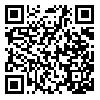BibTeX | RIS | EndNote | Medlars | ProCite | Reference Manager | RefWorks
Send citation to:
URL: http://payavard.tums.ac.ir/article-1-167-en.html
Background: Septicemia is a life threatening status and needs rapid antibiotic treatment. Enterobacteriacea are one of the most important causes of septicemia. So this study is therefore aimed to evaluate antibiotic susceptibility of enterobacteriacea isolates in blood cultures in Shariati Hospital, Tehran, Iran.
Methods: This retrospective study was performed on 138 patients with positive blood culture in Shariati Hospital, Tehran, Iran in 2004, using disk diffusion and Macfarland standard.
Results: Prevalence of isolated enterobacteriacea was respectively E. coli (n=74, 53.6%), Klebsiella (n=37, 26.8%), Enterobacter (n=21, 15.2%), Citrobacter (n=4, 2.9%), Salmonella paratyphi (n=1, 0.7%) and Proteus mirabilis (n=1, 0.7%). The most antibiotic susceptibility among enterobacteriaceaes was ciprofloxacin (60.4%), cloramphenicol (56.8 %) and gentamycin (49.3%). The most antibiotic resistance were seen among cephalotine (78%), cotrimoxazole (62.3 %) and ceftriaxon (57.5 %).
Conclusions: Due to dissimilarity between antibiotic consumption in laboratories and hospitals, it seems that to reach more proper conclusions and choosing better strategy for antibiotic consumption, cooperation should be between laboratories and physicians, plus synergism between drug prescription and antibiotic discs in laboratories.
| Rights and permissions | |
 |
This work is licensed under a Creative Commons Attribution-NonCommercial 4.0 International License. |





